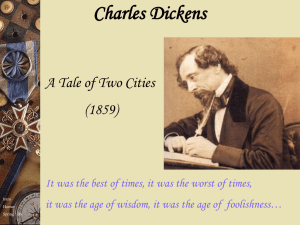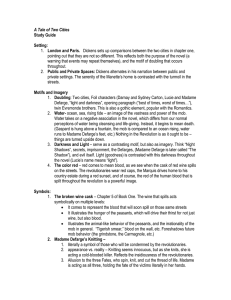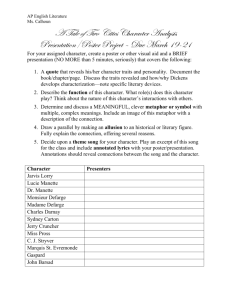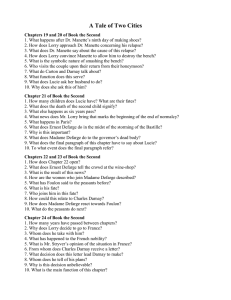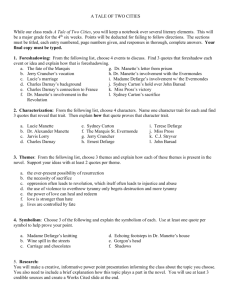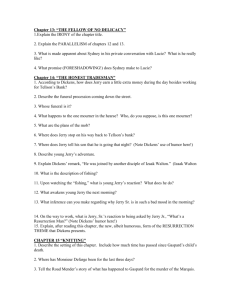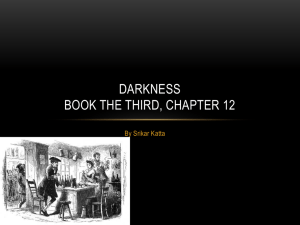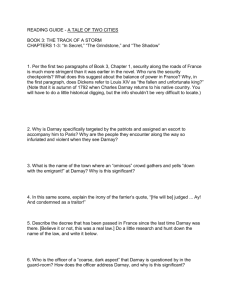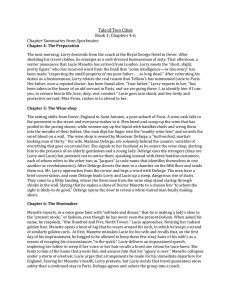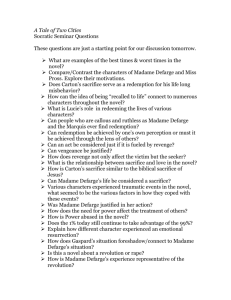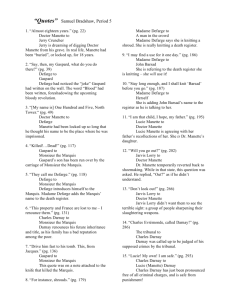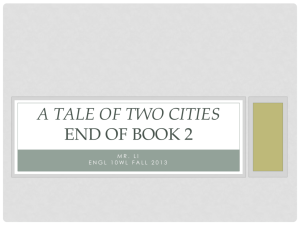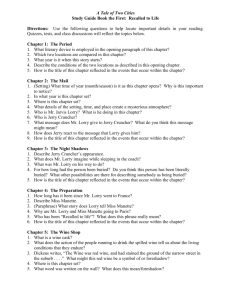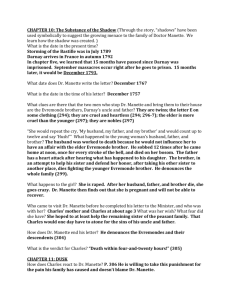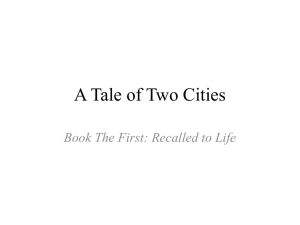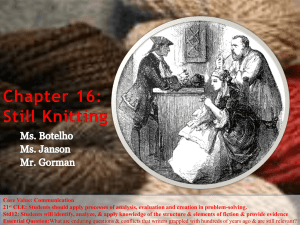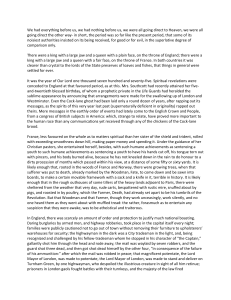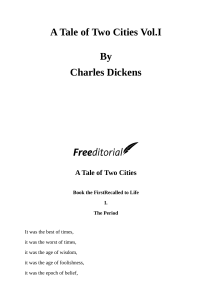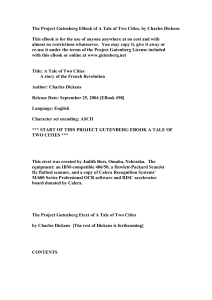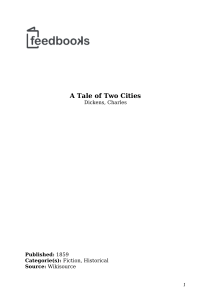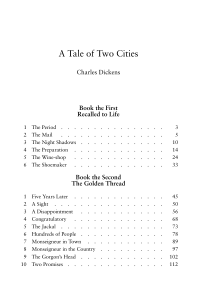Reading questions - Marblehead Public Schools
advertisement
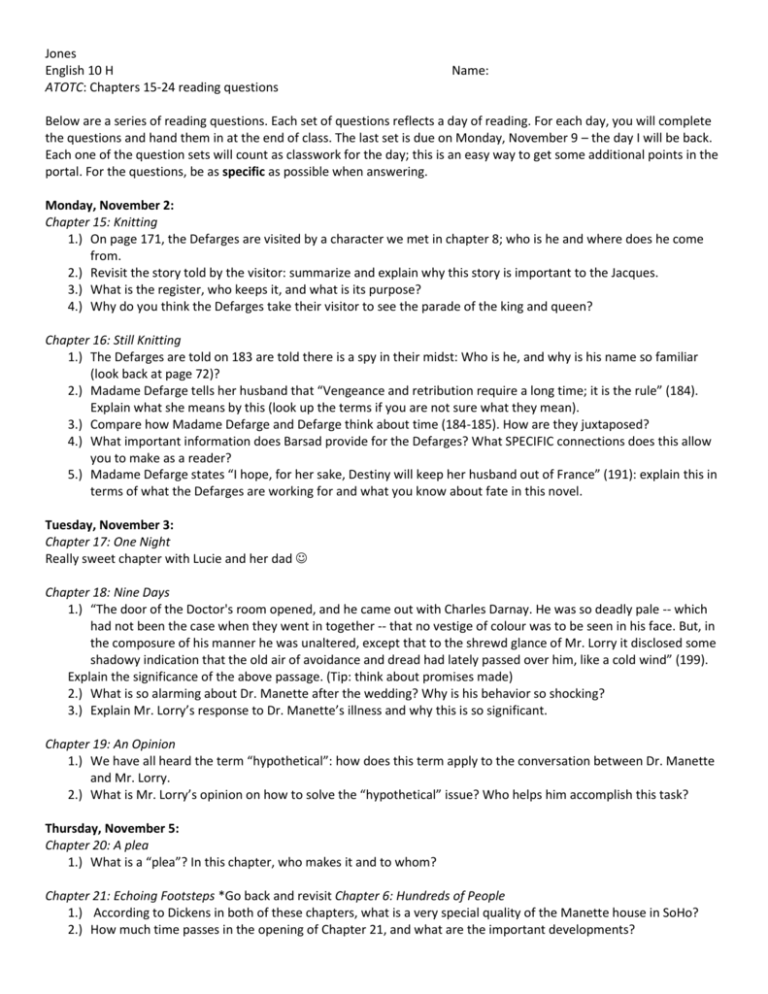
Jones English 10 H ATOTC: Chapters 15-24 reading questions Name: Below are a series of reading questions. Each set of questions reflects a day of reading. For each day, you will complete the questions and hand them in at the end of class. The last set is due on Monday, November 9 – the day I will be back. Each one of the question sets will count as classwork for the day; this is an easy way to get some additional points in the portal. For the questions, be as specific as possible when answering. Monday, November 2: Chapter 15: Knitting 1.) On page 171, the Defarges are visited by a character we met in chapter 8; who is he and where does he come from. 2.) Revisit the story told by the visitor: summarize and explain why this story is important to the Jacques. 3.) What is the register, who keeps it, and what is its purpose? 4.) Why do you think the Defarges take their visitor to see the parade of the king and queen? Chapter 16: Still Knitting 1.) The Defarges are told on 183 are told there is a spy in their midst: Who is he, and why is his name so familiar (look back at page 72)? 2.) Madame Defarge tells her husband that “Vengeance and retribution require a long time; it is the rule” (184). Explain what she means by this (look up the terms if you are not sure what they mean). 3.) Compare how Madame Defarge and Defarge think about time (184-185). How are they juxtaposed? 4.) What important information does Barsad provide for the Defarges? What SPECIFIC connections does this allow you to make as a reader? 5.) Madame Defarge states “I hope, for her sake, Destiny will keep her husband out of France” (191): explain this in terms of what the Defarges are working for and what you know about fate in this novel. Tuesday, November 3: Chapter 17: One Night Really sweet chapter with Lucie and her dad Chapter 18: Nine Days 1.) “The door of the Doctor's room opened, and he came out with Charles Darnay. He was so deadly pale -- which had not been the case when they went in together -- that no vestige of colour was to be seen in his face. But, in the composure of his manner he was unaltered, except that to the shrewd glance of Mr. Lorry it disclosed some shadowy indication that the old air of avoidance and dread had lately passed over him, like a cold wind” (199). Explain the significance of the above passage. (Tip: think about promises made) 2.) What is so alarming about Dr. Manette after the wedding? Why is his behavior so shocking? 3.) Explain Mr. Lorry’s response to Dr. Manette’s illness and why this is so significant. Chapter 19: An Opinion 1.) We have all heard the term “hypothetical”: how does this term apply to the conversation between Dr. Manette and Mr. Lorry. 2.) What is Mr. Lorry’s opinion on how to solve the “hypothetical” issue? Who helps him accomplish this task? Thursday, November 5: Chapter 20: A plea 1.) What is a “plea”? In this chapter, who makes it and to whom? Chapter 21: Echoing Footsteps *Go back and revisit Chapter 6: Hundreds of People 1.) According to Dickens in both of these chapters, what is a very special quality of the Manette house in SoHo? 2.) How much time passes in the opening of Chapter 21, and what are the important developments? 3.) On page 219, we are told we are in “mid-July, one thousand seven hundred and eighty-nine”: based on your knowledge of French history, what is the importance of this date? 4.) On page 220, Mr. Lorry refers to Lucie’s theory on echoes (for reference, look at 107-109: what is this theory, and how does it help us make meaning of this section? 5.) What role do the Defarges play in the Revolution? Be specific and cite text to support your thinking. 6.) “Seven prisoners released, seven gory heads on pikes, the keys of the accursed fortress of the eight strong towers, some discovered letters and other memorials of prisoners of old time, long dead of broken hearts, -such, and such-like, the loudly echoing footsteps of Saint Antoine escort through the Paris streets in mid-July, one thousand seven hundred and eighty-nine. Now, Heaven defeat the fancy of Lucie Darnay, and keep these feet far out of her life! For, they are headlong, mad, and dangerous; and in the years so long after the breaking of the cask at Defarge's wine-shop door, they are not easily purified when once stained red” (227). Explain the connections to be made to other characters and events in the novel. Chapter 22: The Sea Still Rises 1.) Who is The Vengeance, and why does it make sense she hangs out with Madame Defarge? 2.) Explain what Foulon has done to upset the people of Saint Antoine. 3.) Why do you think these crimes would particularly offend and upset the women? 4.) “Down, and up, and head foremost on the steps of the building; now, on his knees; now, on his feet; now, on his back; dragged, and struck at, and stifled by the bunches of grass and straw that were thrust into his face by hundreds of hands; tom, bruised, panting, bleeding, yet always entreating and beseeching for mercy; now full of vehement agony of action, with a small clear space about him as the people drew one another back that they might see; now, a log of dead wood drawn through a forest of legs; he was hauled to the nearest street corner where one of the fatal lamps swung, and there Madame Defarge let him go -- as a cat might have done to a mouse -- and silently and composedly looked at him while they made ready, and while he besought her: the women passionately screeching at him all the time, and the men sternly calling out to have him killed with grass in his mouth. Once, he went aloft, and the rope broke, and they caught him shrieking; twice, he went aloft, and the rope broke, and they caught him shrieking; then, the rope was merciful, and held him, and his head was soon upon a pike, with grass enough in the mouth for all Saint Antoine to dance at the sight of” (231-32). What does this quote reveal about Madame Defarge? Be specific in your answer. For class on Monday, November 9: Chapter 23: Fire Rises 1.) Who comes to the village of the Mender of Roads? Why? 2.) How do the people of the village respond to the events at the chateau? 3.) What do the people do to Monsieur Gabelle? Chapter 24: Drawn to the Loadstone Rock A loadstone is a magnet, specifically one consisting of magnetic oxide of iron. The word “load-stone,” meaning literally “way-stone,” comes from the use of magnets in marine navigation (Oxford English Dictionary); figuratively, a loadstone is an object that attracts. In Dickens’ use of term – in the title of this chapter, and in later references within the chapter – he is alluding to a particular loadstone in the Arabian Nights. In the story called “The Third Calender’s Tale,” Ajib, a prince and a calender (a calender is a Persian or Turkish mendicant dervish [OED]) describes a voyage of discovery in which his ship was irresistibly drawn to an enormous Loadstone Rock. The Rock, exerting such a force on the ship as to pull all the nails out of its structure and sink it, effectively marooned the calender on its shores. 1.) Above you have the story of the Loadstone Rock: what is the “Loadstone Rock” in this chapter? Why? 2.) Explain Darnay’s attitude toward the Revolution? What effect does he think he can have? How is this in keeping with his character? Be specific in your answer.
